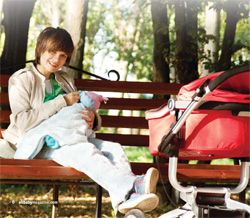Breastfeeding in Public

Many new parents feel a little shy about Moms baring a breast in public to feed their hungry babies. If this is you or your partner, relax — you’re not alone. Many new parents aren’t comfortable with breastfeeding in public. In fact, many parents have been made to feel ashamed when trying to breastfeed their babies in public.
Don’t know how to handle it?
How to nurse more comfortably in public and how to handle a breastfeeding critic when you run into one:
Dress for the occasion
Buy some clothes made specifically for nursing Moms (such as a shirt with a hidden flap over the breast area, allowing Mom to breastfeed while staying covered). If that’s too pricey for you, you can adapt your current wardrobe. Think separates when heading out in public — it’s a lot easier to nurse wearing a zip-up sweater or a top with buttons than a dress. Also, dark clothes hide breast milk leaks better than lighter clothing.
Find accessories
Tote around a receiving blanket or a shawl that you can loosely drape over your shoulder and baby while feeding. Or invest in a baby sling — you can breastfeed discreetly and have your hands free. People often won’t even realize you’re nursing!
Think location, location, location!
Privacy may be hard to find. Be creative! If you’re in a restaurant, look for an area that is a bit more secluded. A booth or a table in a corner allows you to face away from others while you breastfeed. In a mall, look for a quiet bench. You can try facing away from crowds as your baby is latching. During warm weather, you can breastfeed your baby outside on a park bench. If you need more privacy, you can try breastfeeding in your car.
Watch for cues
As always, watch and listen for your baby’s hunger cues. If your baby doesn’t have to wait to be fed, you can avoid cries that get louder and louder, which attract extra attention.
Practice makes perfect
Try breastfeeding at home in front of a mirror to see which positions and which clothes give you the privacy you want. Know that the law is on your side Remember: if someone does confront you, it’s legal for you to breastfeed anywhere (except while driving of course!). Nobody can ask you to stop feeding your baby. Don’t be afraid to show your confidence — you made a healthy parenting
decision for your baby, so be proud!
Handling the critics
Here’s some advice from the international breastfeeding organization, the La Leche League (LLL):
When handling critics, ask yourself, “Who is doing the criticizing?” Is it your grandmother? If so, she may not be aware of the current research about breastfeeding, and that you are, in fact, doing a very healthy thing for your baby. Is it a friend? That friend may not be breastfeeding, may not have children, or simply may not know much about why you’re doing it. Trying to understand the other person’s discomfort may help you figure out how to handle the criticism.
Still not sure what to do?
The LLL has identified five ways to handle criticism.
• Ignore it. If you’re not sure what to do, change the topic or if you can, walk away from the situation. This is an especially useful strategy if the critic is a stranger.
• Inform them. Tell critics about the pros of breastfeeding — it gives them much-needed information and backs up your decision to do this in the first place.
• Humour them. (“I’ve got a little milk addict here!”) Using humour to break the tension can help. Keep it light-hearted though, and try to hide your sarcastic side.
• Acknowledge them. Thank them for sharing their concern and agree to disagree with them.
• Show empathy. Tell them you understand how they feel — it might lead to a discussion about breastfeeding, at which point you may be able to tell them about the benefits of breastfeeding.
Useful phrases
• “It’s amazing, the new research on breastfeeding …”
• “The decision to nurse is so personal, and everyone has to make the decision that’s best for their family …”
• “I’m glad you care so much for my child. I’ve done a lot of research on the topic and feel comfortable with my decision. Would you like me to share some of my new information with you?”
• “The baby’s doctor says …”
• “That’s another way of approaching it …”
• “We really can’t agree here, so why don’t we just agree to disagree and move on?”
• “I think both sides have valid points.”
• “Let’s remember we’re on the same side here — the baby’s.”
• “This works for our family, but it might not work for you.”




